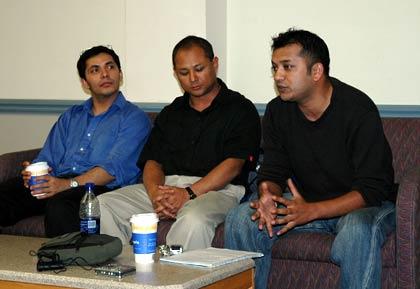
Alliance for Democracy and Human Rights in Nepal, USA
Proudly Announces
“Bichaar Bimarsha”
A periodic socio-political discussions on Nepal
Co-Sponsors:
Human Rights Working Group, CIPA, Columbia University
South Asian Institute, CIPA, Columbia University
Struggle for Democracy in Nepal
Roles and Challenges of Youth
Interaction with Gagan Thapa
Former General Secretary of Nepal Student Union, student wing of Nepali Congress, the largest political party in Nepal, Gagan Thapa is undoubtedly the most prominent student leader who has become one of the leading figures in the current struggle for democracy in Nepal. He was jailed a number of times by King Gyanendra’s government after the royal takeover of February 1st, 2005 on charges of “sedition against the state,” for his outspoken stance against the King’s regime. The Amnesty International had considered him a prisoner of conscience, as he had been detained for his peaceful and legitimate activities in support of democracy and human rights in Nepal. He was released each time only under tremendous pressure from human rights organizations and international governments.
*Mr. Thapa’s presentation will be in Nepali. Written English transcripts of his major points will be available for non-Nepali audience.
** Q & A session will be held in English, with a translation help from the moderator if needed.
Venue:
Columbia University, W. 116th Street and Broadway.
Prentis Hall
632 West 125th Street
Room # 312 (Third Floor)
Columbia Uniiversity
New York, NY 10027.
# 1 or # 9 to 116th Street Station.
Time: 2:00 pm
Date: Saturday, October 22nd, 2005.
Admission: Free
Questions? Call Anil: 917-670-1057 or, Sanjaya: 917-902-2667
Gagan Thapa October 22 Saturday 2 PM Columbia University
A Day In The Life Of Charlie Szrom
Gagan Thapa Talk In Boston: Two Hours Audio
Anil Jha, Bimal Nidhi, Jimmy Carter
Timi Sadak Ma Utreko Dekheko Chhu
Anil Jha, Bimal Nidhi US Tour Logistics
Bimalendra Nidhi US Tour
Gagan Thapa US Tour
September 16 Protest Rally
Sharad Chandra Shaha Is A Dazzling Person
Bharat Mohan Adhikari Is In Town
King Cancels UN Visit
Opposition To The Idea Of Meeting With The King
Anatomy Of The Conflict In Pokhara
Girijaspeak: When Republicans Are Royalists
5 Steps To Democracy
Renaming The Blog In Honor Of Gagan's Release
Gagan Thapa Released
Chargesheeting Gagan: This Regime Has Gone Berserk
Bill Clinton Had Icecream For Lunch
Bill Clinton Has Left The Building